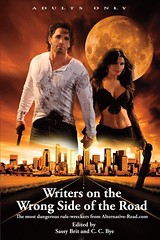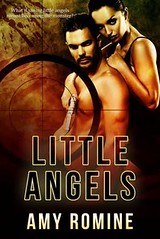Interview with Magdalena Ball, co-author of Cherished Pulse ~ Poetry ~ Compulsive Reader
Conducted by Lucille P. Robinson
LPR: Let me begin by saying it was through Magdalena Ball and her Muse On-Line Conference Workshop that I became interested in book reviewing. Ms. Ball not only conducts workshops for conferences, she runs Preschool Entertainment, The Compulsive Reader and is the author of two non-fiction books. Her writings and reviews have appeared in various on-line and print publications. Ms. Ball, what caused you and Ms. Carolyn Howard-Johnson to co-author a book of poems called Cherished Pulse?
MB: It was Carolyn’s idea! Both of us had written and published a number of love poems and Carolyn had the idea of putting together a chapbook specifically for Valentine’s Day – one that had only love poems, but not the kind of soft-focus cliché ridden television advertisement that often disguise them as love poetry. These would be poems that celebrated real love, with real poetry – not Ogdan Nash styled cute couplets (sorry Ogdan…). It started as a tossed out idea but once we began playing with it, and got a great artist – Vicki Thomas—on board, it all came together easily.
LPR: I have read Cherished Pulse and enjoyed your poems. Will you describe how you came to write poems and why you have used the forces of nature to describe the processes of love?
MB: I’ve been writing poetry since I’ve been a young child. It’s a very natural form of expression for me – perhaps more natural than fiction, which I also write, since I tend to think in metaphor and am always trying to say more than I’m generally capable of! It helps that I come from a somewhat artistic and musical family—we were always bursting into song, quoting poems, and using metaphor to convey things to one another. Once when I was about ten, my uncle gave me a set of poetry books containing Sylvia Plath’s Arial, Anne Sexton’s Live or Die, Rimbaud’s The Drunken Boat, and Bertolt Brecht’s Manual of Piety. Now admittedly I’d never give poetry like that to my own ten year old! But in my case, it was a pivotal moment. I loved that he was giving me grown up words. I loved the poems, and held tight to the way they conveyed the gamut of human emotions so economically. I’ve been taking poetry fairly seriously ever since. And I’ll use anything—the forces of nature, the cosmos, quantum physics (like the poem “Event Horizon” in Cherished Pulse. See my book Quark Soup for some more examples of that), a sporting event, a current affair, etc. The key thing for me in poetry is to convey meaning, and that often means that you sometimes have to knock two things together that aren’t traditionally associated with one another to make the inchoate explicit.
LPR: Your poems are unconventional poems, meaning they do not rhyme. Do they develop from your life experiences? What do you like most about writing poems?
MB: I’m not sure that I’d agree that non-rhyming poems are unconventional. “Traditional” poetry style and structure, by which I mean that the poem follows some kind of formal rule such as rhymed couplets, the limerick form, the sonnet, or even Haiku or the Fibonacci sequence are exceptions to modern published poetry rather than the norm (at least since the early 20th Century when Eliot’s The Waste Land took the poetry world by storm). Some of the greatest, most classical of modern poets like W.B Yeats, or W.S. Auden don’t generally rhyme (though Eliot, Yeats and Auden have all used the subtle and occasional use of rhyme in ways that have been extraordinary – Yeat’s “The Second Coming” is one of the greatest rhymed poems I’ve ever read. Rhyming, the use of alliteration, internal rhyme, and rhythm are all part of the poet’s arsenal. I tend to rhyme only occasionally, and feel that regular rhyming patterns generally (with some very notable exceptions like the one above) tend to interfere with the poem’s meaning for me – it makes the poem seem whimsical and forces the reader to listen for the rhyme rather than fall into the meaning of the poem. That said, what is perhaps unconventional is that Carolyn and I have pitched Cherished Pulse at a market which is flooded with rhyming and syrupy love poetry and certainly these poems are generally not rhyming nor syrupy. You wouldn’t find one of them in a Hallmark card to be sure. So there is a degree of unconventionality in them. But I do believe that people are cynical of cliché, and ready for deeper communication.
Sometimes my poems come from life (and I’m a horrible magpie—I’ll take anything—I’ve been known to suddenly start smiling in the midst of an argument as I imagine a good phrase in writing), and sometimes I write to a topic or theme for a contest. For my chapbook Quark Soup, I tended to look for inspiration in the New Scientist magazine, since I was pulling together a collection on a theme. It worked – I got at least 2 poems from each magazine, sometimes more – but I’ll write about anything that moves me, bothers me, and above all, leaves me feeling like I need to explore beyond the surface. And of course, that is my answer to the third question – I feel that poetry, like music, can go further with meaning than our usual sentences with subject, predicate, modifier. Poetry can illuminate intense emotions; can reveal wonder, pain, joy in ways that we haven’t found words for before. It’s a bridge that brings people together, and opens doors.
LPR: You have written some fiction. Describe the type of fiction you like writing and tell us what you have published in this genre.
MB: I tend to read and write mostly the literary fiction genre. Literary fiction is an odd genre in that it is mostly defined by what it isn’t – it isn’t romance, not thriller, not mystery, not science fiction, but rather tends to focus on character development, narrative structure, and the creation of meaning rather than on pace and plotting, although good plotting is still a critical element of all fiction. I’ve published a lot of short stories, but my first novel, Sleep Before Evening will be released in the Northern Spring (about April 2007) by BeWrite books. It’s a coming of age story about a nineteen year old who begins to fall apart after the death of her philosopher grandfather. The story is a little grungy at times as the protagonist moves away from her classical upbringing and finds, well, sex, drugs and rock and roll, but I think overall it’s an uplifting story about the power of art.
LPR: I see you are a very busy woman. How do you find the time to write? Do you follow a particular schedule?
MB: I am busy it’s true! I have 3 young children (I could probably stop there and justify the word!), a day job, a novel about to come out, books to promote, novel 2 in progress, and I like to try and do lots of non-fiction writing like reviews, editorial, as well as poetry. Plus I’m the editor of 2 websites, so there’s always someone or something clamouring for attention. I just try to write in bits and pieces wherever and whenever I can. I also plan a lot so I can jump straight in and so that the long-term work like the novel gets some priority in the overall scheme of things. What I don’t do is wait for quiet, or ideal conditions. I never get that!
LPR: Do you speed write a first draft and then spend your time editing it or do you outline first?
MB: I like the idea of speedwriting a draft, but I’m not sure I’m up to speedwriting anything! I do a combination of both outlining and drafting – I try and get the basics out – a rough plot and plot points (basically where things turn or go wrong), a fairly clear sense of the key characters and the overall theme. I also try to have a rough set of chapters so I can break up the writing into manageable bits. But after that I tend to work through the drafting process and hold back from being too self-critical. The ‘final’ draft is a very long way from a ready to publish novel – there’s a lot of editing after that, and often many revisions (Sleep had about 6 full rewrites).
LPR: What authors have inspired your writing of Cherished Pulse?
MB: I’m inspired by many poets, and there are so many wonderful ones. Of course I love the greats I mentioned earlier (I’ve been a Yeats fan for a long time), but also and pretty much just off the top of my head, Stevie Smith, Emily Dickenson, Dorothy Porter, William Carlos Williams, Luke Davies’ Totem (an extended love poem which shows what language can do), and many others – I could probably go on and on – I read a lot! More than I write.
LPR: Have you any favorite writing tips you can share with beginning writers?
MB: Read! It’s critical to develop your sense of what is good and what isn’t good writing. Also don’t self-edit too much and try to do a little writing every day. What I read is good – and far better than I can hope to write now (but always aspire to the best) and it’s easy to just decide that there’s no point in putting my own paltry offering out to the world where there’s already so much good stuff available. You just have to turn that critical voice off and keep writing. Like all art, writing requires hard work, not inspiration, to become good, and you have to keep doing it, editing it, taking risks, revising, taking advice and moving forward. Not even experienced and great writers get perfection on the first draft.
LPR: You have a good imagination, Magdalena. Would you mind suggesting three topics that would be good for poems?
MB: Sure. What about (these are really six topics but as dichotomies they can play against one another): a) birth/death b) war/peace c) voyage/return
The topics are deliberately vague. You could, for example (as I have), juxtapose the birth of a child with the birth of the universe and play the two against one another.
LPR: They are great! Thank you. Finally, where can we buy Cherished Pulse and your other writings?
MB: You can find everything at my website The Compulsive Reader www.compulsivereader.com/html including lots of book giveaways and a free newsletter. If you forget the html and type in www.compulsivereader.com you’ll get there too. To get directly to Cherished Pulse, visit:
http://www.compulsivereader.com/html/images/cherishedpulse.htm
If you sign up for the free newsletter, I’ll shamelessly bang my drum and send purchasing links (and no doubt some outrageously good promotional deals!) for Sleep Before Evening when it’s out. Any would be reviewers can contact me directly for more details.
LPR: Thank you for sharing your thoughts and ideas with us. It's been a pleasure to speak with you and a most enjoyable interview. Good luck with all your future endeavours.








No comments:
Thanks for taking the time to leave a sassy comment. It's truly appreciated. I aim to get back to you as soon as possible -- Sassy :)